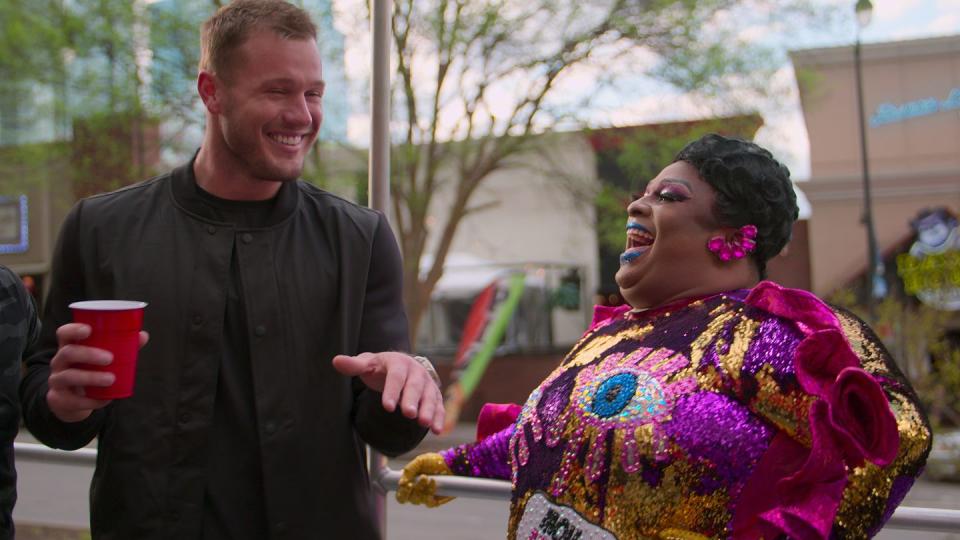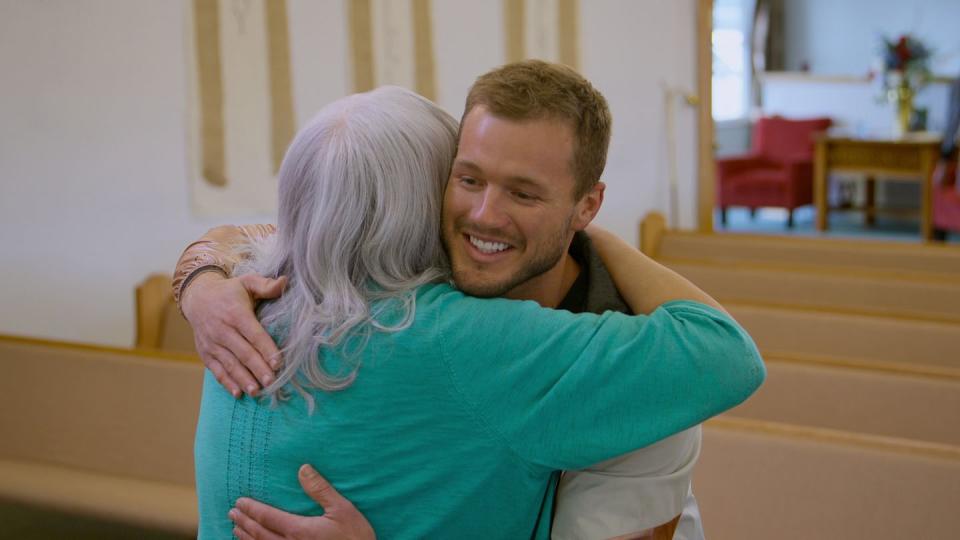Netflix's 'Coming Out Colton' Isn't Really About Coming Out At All

- Oops!Something went wrong.Please try again later.
I'll be honest. I've deleted everything I've written about Coming Out Colton, Netflix's new docuseries following the former Bachelor star's decision to go public with his sexuality, four or five times. Coming out, actually coming out, is intimate and difficult and complex. It's impossible to replicate, and best left un-judged. When I did so, my dad told me that I would die of AIDS. I have a friend who still hasn't reconnected with her family after revealing that she is a lesbian. I've seen so many different variations of the coming out story unfold, just in my friend group alone—some who have been unexpectedly accepted, others whose families have damned them to hell so God doesn't have to.
So there's always a part of you that sympathizes with whatever that process ends up looking like for someone, which is why I found myself typing paragraphs only to highlight them and erase them, again and again. Colton Underwood's journey with his sexuality, as I wrote the day he came out publicly, is his. And I kept deleting my criticisms of Coming Out Colton because I don't want to be the gay man throwing stones about how another man decides to live honestly. But none of my criticisms are about Underwood's actual coming out. My discomfort with the show, rather, is how he has used this journey for personal gain, quick wealth, and celebrity.
I guess the writing was pretty clear from Day One of Colton's life as a public gay figure. Not 24 hours after his tell-all interview with Robin Roberts, Netflix announced that out gay Olympian Gus Kenworthy would join Underwood in a Netflix series documenting his life as a gay man and his coming out experience. It was gayness commodified. Fuck selling Tummy Tea on Instagram when you have a whole marginalized community to profit off of, right?
It was a hunch I had then, and something confirmed upon watching: The problem with Coming Out Colton is not his clumsy reveal of his sexuality—in fact, that's what I liked most about his journey—or even his clear apprehension that this "new gay life" will divorce him of his heteronormative fantasy (children, marriage, making out strictly for The Right Reasons™) but that the series seems desperate to wring every last drop of drama out of a relatively tame story. There are no real, identifiable stakes, except maybe what his future as a celebrity will look like. Even with a brutish dad in a Browning hat, Underwood wasn't facing a falling out from his family. He wasn't going to be ostracized by the queer community, either. Whether Underwood (who is listed as an executive producer on the series) intended it or not, Coming Out Colton is a caricature of a coming out that feigns real world consequences for the sake of a TV cliffhanger.
The 30-minute episodes are split into chapters that are meant to best capture Underwood's spirit (family, football, church, friends) and explore what happens when Underwood decides to fill in the people in those parts of his life with the secret of his sexuality. It moves too fast, refuses to get deep, and breezes over the fact that no actual drama unfolds—which, by the way, is a good thing for real lives. If only every coming out faced so little fallout and swift acceptance! But instead of addressing how much of a blessing that is, it promptly moves on to the next issue in search of a new foreboding plot point. In the first four chapters, Underwood comes out to his immediate family and past football colleagues, makes a quick stop at a sex shop, gets ostracized from the church, and then reconciles his entire faith before then deciding: hey, we have to tell America about this, and since everything else has been a smash, let's do it on national television. He and his dad decide that the best way to address this with the nation is via an interview on Good Morning America.
It's all so calculated.

In the "church" episode, when Underwood's pastor tells Colton that while he's welcome to come to church, his sexuality is not up for debate—a moment that, in theory, is beyond comprehension in terms of its emotional devastation—the presentation of the production wipes it of any real human emotion. The conversation feels like any old contrived reality TV moment where one character stabs another in the back. (You would think that something so intimate would be treated with more gravitas than, say, a thrown glass of white wine or a flipped table, but it's not.) You forget that this is a conversation in which one man is telling another that his eternal life has been judged—and not in his favor. For someone who says his faith is so severely important to him, the whole crisis of reconciling his queerness with his beliefs is neatly packed away in one thirty minute arc, sparsely brought up again.
That's a relationship I have struggled with mightily in my own life. And one of the reasons I was first invested in Colton's evolution is because I, too, was raised strongly in Christianity. God occupies a difficult place in a lot of queer lives, certainly in mine, but I understand the idea of it being a literal saving grace. It doesn't fit in a single episode. It hardly fits in a lifetime. Coming Out Colton treats it like a fire to put out just once, not a mystery to unravel again and again.
It all begs the question, who is this production for? I'd feel a lot better if I believed that Underwood was truly trying to offer visibility for anyone at home whose desperate to figure out how to come out. But I don't. Underwood's decision to do it feels more like an opportunity for Underwood to rehabilitate his image. Something that feels especially the case as he addresses his past misfires, like the alleged stalking of his past Bachelor girlfriend, Cassie (who declined to be a part of the series). As for who is tuning in, I imagine the audience is largely separated into two camps: queer people hoping to find some semblance of respectable representation and members of Bachelor nation, who could, after 25 seasons of straight love being aired nightly, likely use a positive example of queerness in their lives. In pursuit of paycheck and compelling second act, Underwood lets them all down.

The most unpalatable piece of Colton's story is how it chooses to finish. After over three hours of watching Underwood turn down an onslaught of potential suitors and receive pep talks from queer religious leaders about how Colton can forgive himself, the final episode follows Underwood, Kenworthy, and Underwood's father as they try to mitigate the fallout of Colton's Bad Coming Out. Colton explains that he is simply the most recent story in the fabric of the queer community. Then a montage plays that features figures like Marsha P. Johnson and Harvey Milk and Matthew Shepard.
I wanted to reach through the computer and grab him. I want to shake him and ask him if he's read The Laramie Project. If he knows about how Harvey Milk or Oliver Sipple or if he knows how Marsha P. Johnson dies. And for the first time, I will assume something about Underwood, because no one who knows those answers would dare put themselves in the same line up. Underwood and the other producers of Coming Out Colton had an opportunity to tell a story that could have spoken to the LGBTQ community, but doing so would have taken empathy and awareness. It would have taken effort. And for a reality star, why expend the energy when you have a camera crew and 15 minutes to burn?
You Might Also Like

